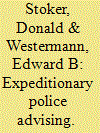| Srl | Item |
| 1 |
ID:
164151


|
|
|
|
|
| Summary/Abstract |
The practice of dispatching teams of police advisors to other states to build or train foreign security forces began at the end of the nineteenth century, yet there exists no definitive history of the practice, or any definitive theoretical approach underpinning why such missions succeed or fail. Drawing upon their recent edited book on expeditionary police advising, and by examining the donor or sending states, the host nations, and the use of police in counterinsurgency situations, the authors present some key reasons why such missions fail, and lay some groundwork for additional study of this important subject.
|
|
|
|
|
|
|
|
|
|
|
|
|
|
|
|
| 2 |
ID:
083484


|
|
|
|
|
| Publication |
2008.
|
| Summary/Abstract |
In the Soviet Union, SS and police forces adopted the strategy of the direct approach as the keystone of German security policy in the occupied territories. Operating in conjunction with Wehrmacht units and indigenous auxiliaries, Reich Leader of the SS and Chief of the German Police Heinrich Himmler's Uniformed Police (Ordnungspolizei) battalions, became essential instruments in the subjugation, exploitation, and pacification of the German rear areas. This essay examines the cooperative relationship that developed between SS and police forces, the Wehrmacht, and indigenous auxiliaries during the German anti-partisan campaign in the East. On the one hand, the cooperation of the police with the German armed forces reflected a true 'inter-agency' approach to counter-insurgency warfare; an approach formalised in policy agreements between both organisations prior to the 1941 invasion of Russia and cemented in combined operations aimed at Soviet partisans and their supporters. On the other hand, this analysis of combined operations between German SS and police and Wehrmacht forces offers further evidence of the key role played by the German Army and Air Force in the anti-partisan campaign, and ultimately genocide.
|
|
|
|
|
|
|
|
|
|
|
|
|
|
|
|